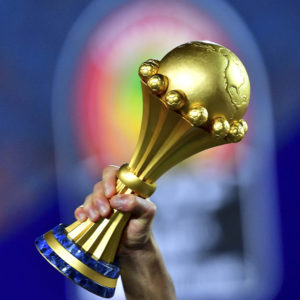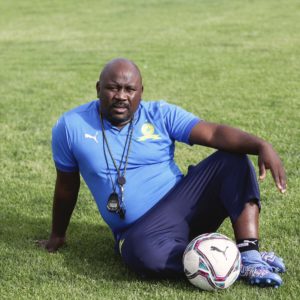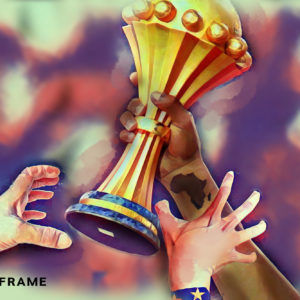Nigeria’s Super Eagles flying under a storm
The three-time Afcon champions have had a tumultuous time heading into the 2021 edition of the tournament, and some important players are absent too. But never underestimate them.
Author:
11 January 2022

Nigeria’s preparations for the 2021 Africa Cup of Nations (Afcon) have been chaotic, to say the least. The sacking of long-standing manager Gernot Rohr three weeks before the tournament was an early sign of gathering storm clouds, and since then there’s been a heavy downpour of chaos.
Former international and erstwhile technical director Augustine Eguavoen is in charge of the Super Eagles in Cameroon. But he is operating under the watchful eye of newly appointed coach José Peseiro, from Portugal, who has been contracted to take charge after the Afcon. Essentially, being in an “observer” role only, the former Sporting Lisbon and Venezuela manager will be supervising his own boss for the next few weeks.
Things are no better on the playing side.
Related article:
The enviable depth Nigeria amassed over the past couple of years has been decimated by injuries and withdrawals. Since announcing the 28-man squad, there have been no less than five alterations, with crucial defender Leon Balogun and versatile midfielder Shehu Abdullahi dropping out. On-form Watford forward Emmanuel Dennis missed out after his club claimed his invitation was sent late, while 2019 Afcon top scorer Odion Ighalo has also seen his hopes of participation dashed by the refusal of his club, Al-Shabab, to release him.
Star striker Victor Osimhen is still in recovery from a facial fracture he sustained in November and asked to be left out after testing positive for Covid-19. He is not the only one: five members of the squad tested positive a few days before their departure for the tournament, according to Nigeria Football Federation (NFF) president Amaju Pinnick.
Goalkeeping uncertainty, defensive frailties, being ludicrously light in midfield and the inability to win convincingly blighted the last two years of Rohr’s reign. And there is always the little matter of money problems, too. Captain Ahmed Musa revealed in early January that the players are still expecting bonuses from two matches.
What this all meant for Nigeria was that, going into the Afcon, expectations among the national team’s fans were at an all-time low.
Thriving amid chaos
Nigeria is, however, no stranger to dysfunction, and indeed has made a habit of thriving in precisely these sorts of situations.
There have been parallels drawn between the general sentiment around this team and the pessimism that accompanied Stephen Keshi’s Afcon-winning team in 2013. With a relatively inexperienced squad and unconvincing results as they started the tournament in South Africa, Nigeria were expected to underperform. Famously, the NFF booked the team’s return flight ahead of their quarterfinal meeting with favourites Ivory Coast.
Aware of this, Keshi forged a siege mentality around his team that carried them all the way through to the final and a third continental triumph, and he became only the second man to win the Afcon as both player and coach.
It has become something of an unwanted trademark, but often Nigeria has risen to the occasion when all the chips were down and all the signs pointed to disaster.
Related article:
Some of that is down to the sheer amount of talent available within and around the Super Eagles. Traditionally, that abundance of technical quality – combined with a competitive spirit and attitude – has been strong enough to carry the Super Eagles far along in tournaments, and it is something they will once again be banking on.
While the squad that made the short trip to Cameroon is missing several important personnel and there are a number of question marks in key positions, it speaks to their profile in world football that Nigeria are still capable of fielding a competitive team.
Drawn in a tricky group D with seven-time champions Egypt, Sudan and Guinea-Bissau, the Super Eagles must fly above their internal issues to reach the knockout stage in their quest for another continental cup.
The power of football
Africa’s most populous nation with over 200 million people, Nigeria is home to more than 300 ethnic groups. Football is often described as the “opium” or uniting factor in a fragmented country. Apart from the popular Nollywood movie industry and the stars of Afrobeat, it is footballers who occasionally manage to steal the limelight from the economic and political problems plaguing the West African nation.
The national team, often inspired by European-based superstars, provided one of the few positive images to come out of the struggling “giant of Africa”. And some of the players are fully aware of this reality.
“Our fans expect so much from us and I completely get it because despite being a player I am also a fan,” said defender Kenneth Omeruo. “When you play for Nigeria, you carry the hopes of a big nation. And it doesn’t matter the opponents we face, our supporters expect us to always win.”
Related article:
Prospects in the past have been high for Nigeria heading into international tournaments. But in the build-up to this Afcon in Cameroon, many were believing that reaching the knockout stage of the competition would be considered a success. Half of the squad members in Cameroon are Afcon debutants.
“We understand this feeling and I particularly get this because we’ve been here before,” said Omeruo, one of two survivors from the squad that won the last title on a glorious night in Johannesburg in 2013.
“I believe we have to focus on ourselves and not the critics. Things may have been a bit tough in 2021, but this is another year, a different tournament and a completely motivated team hoping to make our nation proud.”
One of the players to watch in this tournament for the Super Eagles is Chidera Ejuke of CSKA Moscow in Russia. If Nigeria is to shine in Cameroon, Ejuke will be a central part of it with his extravagant skills, impressive speed and uncanny ability to wriggle past opponents.
A proud record
Group rivals Egypt may be the most successful side with seven titles, but Nigeria’s collection of 15 podium appearances in 18 Afcon tournaments is the highest tally in Africa’s flagship football championship.
The only times they ended without any form of medal were in their debut in 1963, in Libya 40 years ago and at Ghana 2008. They have won the trophy three times (1980, 1994 and 2013), finished as runners-up four times (1984, 1988, 1990 and 2000) and picked up the bronze medal eight times (1976, 1978, 1992, 2002, 2004, 2006, 2010 and 2019).
Without question, Nigeria is one of Africa’s biggest and most successful football nations – and it has the trophies to back this up. In addition to its Afcon successes, Nigeria was the first African nation to win football gold at the Olympic Games, in Atlanta in 1996, and it is the most successful country at the Fifa Under-17 World Cup with five titles. Throw in its nine titles at the Women’s Afcon and seven titles in the Under-20 African Youth Championship, and you get the picture of a nation that has consistently been in the top tier of African football.
Related article:
“This pedigree in Africa is something that sets the tone for us as footballers,” admitted France-based winger Moses Simon. “To earn the backing of fans in Nigeria you must achieve success, and collectively that’s what we want to do.”
Since taking charge of the NFF in September 2014, Pinnick, who is a member of the Fifa council, has banged the drum about how he would change the way Nigerian football is run. However, under his leadership the team failed to qualify for back-to-back Afcons in 2015 and 2017, before finishing third in 2019. The group stage exit at the 2018 World Cup was another blow to his ambition.
Pinnick has consistently reminded his vocal critics that, amid the financial problems, he has single-handedly kept the game afloat with his personal resources and contacts. Yet his administration is riddled with problems: poor organisation, bad management and administrative deficiencies. Inevitably it affects the team’s performances.
The team’s lack of preparatory games and managerial changes have left many questioning Pinnick’s declaration that the country is good enough for a fourth title. “God has special love for Nigeria,” he told television channel Arise News. “Our preparations may look lacklustre, but trust me, when our players wear the green and white jerseys, it is a different ball game.”




